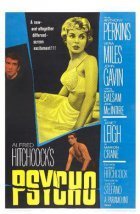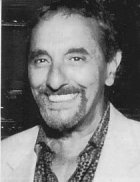
Psycho Page #3
- R
- Year:
- 1960
- 109 min
- 861,049 Views
He starts quickly away when it looks like Cassidy is going
to come and pull him bodily into the office. When the men
are gone and the door is closed, Caroline picks up a bundle,
smiles at it.
CAROLINE:
He was flirting with you. I guess he
noticed my wedding ring.
Mary has put one bundle into a large envelope and takes the
other from Caroline. When the bills are away, she puts the
filled envelope in her handbag, notices the remaining deed
copies on her desk, picks them up, goes to the private office
door, knocks, starts to open door as:
LOWERY (O.S.)
Come in.
INT. LOWERY'S PRIVATE OFFICE - (DAY)
Mary opens door, looks in. Cassidy is drinking from a large
tumbler, winks at her without pausing in his drinking. Mary
remains on threshold a moment, then crosses to the desk,
talking as she goes.
MARY:
The copies. Mr. Lowery, if you don't
mind, I'd like to go right on home
after the bank. I have a slight...
CASSIDY:
You go right home! Me and your boss
are going out to get ourselves a
little drinkin' done!
(to Lowery)
Right?
LOWERY:
(to Mary)
Of course. You feeling ill?
MARY:
A headache.
CASSIDY:
You need a week-end in Las Vegas...
playground of the world!
MARY:
I'm going to spend this week-end in
bed.
(starts out)
CASSIDY:
(to Lowery)
Only playground that beats Las Vegas!
Mary goes back out into the outer office, closes door.
Mary goes to her desk, takes the handbag, checks to make
sure the money-filled envelope is tucked well down into it.
During this:
CAROLINE:
Aren't you going to take the pills?
(as Mary shakes her
head)
They'll knock that headache out.
MARY:
I don't need pills... just sleep.
She goes to the door.
DISSOLVE:
INT. MARY'S BEDROOM - (DAY)
A double bed in the foreground. We just see the far side as
the CAMERA SHOOTS across. Mary enters the scene, clad only
in her slip. Perhaps she is about to get into bed. Behind
her is an open closet, but too dark inside for us to see any
contents. As Mary turns to the closet the CAMERA LOWERS to
show a close view of the $40,000 in the envelope on our side
of the bed.
Mary takes a dress from the closet and starts to put it on
as the CAMERA RETREATS to reveal a packed but not yet closed
suitcase also on the bed. Mary zips up her dress and then
brings some final garments from the closet.
She comes around to the suitcase and puts them on the top.
Mary works with haste and in tension, as if acting on an
impulse which might vanish as quickly as it came.
The suitcase filled now, she checks around the room, then
takes her handbag to the bed, puts in the money-filled
envelope, and then slams the suitcase shut. Then filled she
looks at her small bedroom desk, goes to it, removes a small
file-envelope from one of the drawers. It is one of those
brown envelopes in which one keeps important papers and
policies and certificates. She checks its contents briefly,
puts it on the bed, opens another desk drawer, takes out her
bank book, tosses it on the bed. Then she packs both the
file-envelope and the bank book, into her handbag, takes one
quick last look around the room, picks up the handbag and
the suitcase and goes out of the room.
CUT TO:
EXT. MARY'S GARAGE - (DAY)
A two-car garage. One car is gone. Mary's car is parked in
the driveway. The CAMERA is low enough so that we can easily
read the Arizona number plate in the foreground.
Mary comes out of house, starts for the trunk, intending to
put the suitcase in, changes her mind, places the suitcase
and her handbag on the front seat, gets in, starts the car,
begins to back out of driveway.
DISSOLVE TO:
EXT. MAIN STREET IN MIDTOWN PHOENIX - (DAY)
We are close on Mary's car, shooting in at her troubled,
guilty face. She seems to be driving with that excess care
of one who does not wish to be stopped for a minor traffic
irregularity. She stops for a red light at a main
intersection.
FROM MARY'S VIEWPOINT - (DAY)
We see Lowery and Cassidy crossing the street, passing right
in front of Mary's car.
MARY'S CAR - (DAY)
Mary freezes.
EXT. MAIN STREET IN MIDTOWN PHOENIX - (DAY)
Cassidy, glancing into car, sees Mary, lets out a cheery
exclamation, elbows Lowery. Lowery turns, sees Mary, smiles
MARY'S CAR - (DAY)
Mary watches the entire exchange with a look of stony horror
on her face.
EXT. MAIN STREET IN MIDTOWN PHOENIX - (DAY)
Now we look closely at Lowery. As he reaches the curb, a
small confusion brightens his face. He remembers that Mary
intended to "spend the weekend in bed." He considers,
curiously, turns, looks back at her, a slight frown on his
face.
MARY'S CAR - (DAY)
Mary sees the pause and the look.
EXT. MAIN STREET IN MIDTOWN PHOENIX - (DAY)
For a moment it even looks as if Lowery might be meaning to
cross back to the car.
MARY'S CAR - (DAY)
Mary's tension is unbearable. And at that moment we hear the
shrill shriek of the traffic cop's whistle.
Mary zooms the car away.
DISSOLVE TO:
EXT. HIGHWAY - (DAY)
Mary in car, driving, safely away from town. Her look is
less tense now, and more purposeful. After a moment, she
checks the fuel gauge, frowns, looks along highway for a gas
station.
FAST DISSOLVE TO:
MARY'S CAR - (DAY)
Approaching and leaving city limits.
MARY - (DAY)
Looks at gas gauge.
We see Mary's car drive in, come to a stop. There are no
other cars about, this being a gas station off the main
highway, and the attendant is obviously in the shack. Mary
looks worried about having to make this stop, keeps her face
turned away from the shack, not wishing it to be seen.
No one comes and for a moment Mary considers driving on, as
if the emptiness of the station were a warning, an omen that
she should listen to. But the gas registers almost empty.
She has to blow her horn.
A YOUNG MAN comes out of the shack, starts toward her car.
At that moment, we HEAR the RINGING of the TELEPHONE in the
shack. The Attendant walks a few steps further, toward Mary's
car, then decides to go back and answer the phone. The phone's
insistent ringing unnerves Mary.
She starts her car, zooms off.
We see the Attendant, phone in hand, in the doorway of shack.
He looks after the departing car with little or no expression.
CAR:
The car grows smaller as it races up the road. The sun is
setting. There is something vaguely ominous about the
darkening sky into which the car seems to be disappearing.
DISSOLVE TO:
MARY IN CAR - (NIGHT)
The oncoming headlights hurt Mary's eyes. She is getting
sleepy and her vision is blurring. Her eyes close,
involuntarily, snap open again. She stretches than wide, as
if forcing them to stay open. The oncoming lights seem to
glare to a point beyond endurance. She murmurs "Sam - Sam."
LONG LAP DISSOLVE:
We see Mary's car, dim in the early dawn, tilted on the soft
shoulder of the road, looking somehow sad and pathetic, like
a child's thrown-away toy. And from this angle it would appear
that the car is empty.
Translation
Translate and read this script in other languages:
Select another language:
- - Select -
- 简体中文 (Chinese - Simplified)
- 繁體中文 (Chinese - Traditional)
- Español (Spanish)
- Esperanto (Esperanto)
- 日本語 (Japanese)
- Português (Portuguese)
- Deutsch (German)
- العربية (Arabic)
- Français (French)
- Русский (Russian)
- ಕನ್ನಡ (Kannada)
- 한국어 (Korean)
- עברית (Hebrew)
- Gaeilge (Irish)
- Українська (Ukrainian)
- اردو (Urdu)
- Magyar (Hungarian)
- मानक हिन्दी (Hindi)
- Indonesia (Indonesian)
- Italiano (Italian)
- தமிழ் (Tamil)
- Türkçe (Turkish)
- తెలుగు (Telugu)
- ภาษาไทย (Thai)
- Tiếng Việt (Vietnamese)
- Čeština (Czech)
- Polski (Polish)
- Bahasa Indonesia (Indonesian)
- Românește (Romanian)
- Nederlands (Dutch)
- Ελληνικά (Greek)
- Latinum (Latin)
- Svenska (Swedish)
- Dansk (Danish)
- Suomi (Finnish)
- فارسی (Persian)
- ייִדיש (Yiddish)
- հայերեն (Armenian)
- Norsk (Norwegian)
- English (English)
Citation
Use the citation below to add this screenplay to your bibliography:
Style:MLAChicagoAPA
"Psycho" Scripts.com. STANDS4 LLC, 2025. Web. 30 Jan. 2025. <https://www.scripts.com/script/psycho_61>.







Discuss this script with the community:
Report Comment
We're doing our best to make sure our content is useful, accurate and safe.
If by any chance you spot an inappropriate comment while navigating through our website please use this form to let us know, and we'll take care of it shortly.
Attachment
You need to be logged in to favorite.
Log In